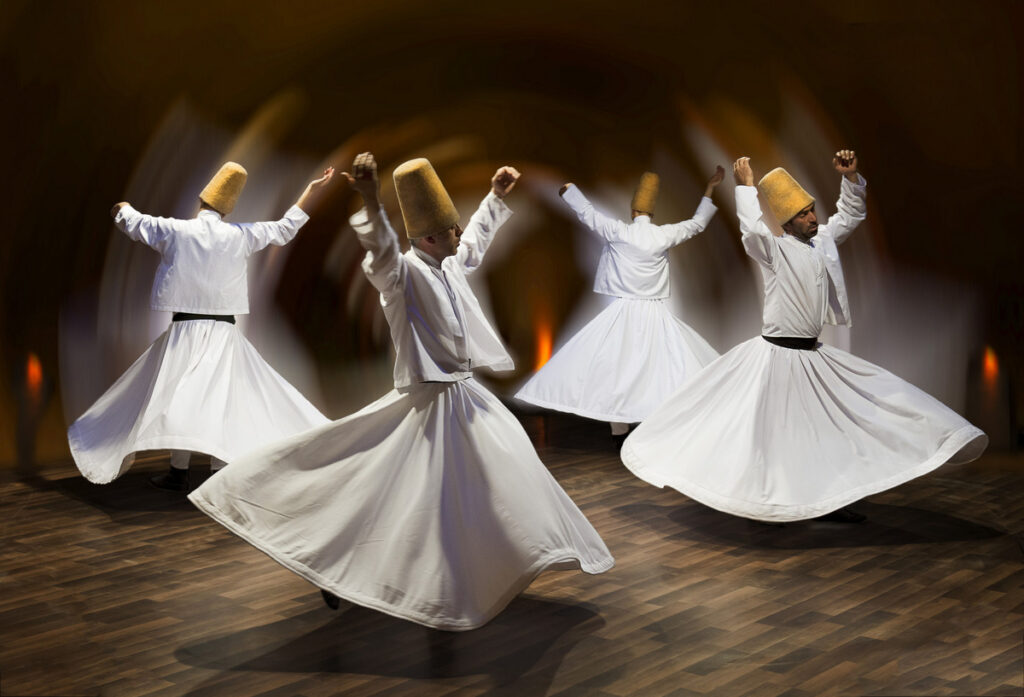In short, these are members of the Sufi brotherhood, a religious order (Tariqa) in Islam – especially people of lower degrees of initiation, ordinary participants, so to speak. Their high-ranking supporters are theoretically also dervishes, but they have more complex responsibilities, so they are not always called that.

Dervishes were also called mendicants and usually itinerant ascetics who do this for the sake of spiritual self-development in the field of the Muslim faith. Having rejected the joys of the world, they went on a journey to see the world and come to enlightenment for the sake of Allah.
Every tariqa participant is a dervish, but not every dervish is a tariqa participant. They may be disgusted by the state in various public associations, many start their journey for personal reasons. A person, first of all, left his native home for himself and began to wander, adhering to numerous restrictions. And not every beggar and vagabond was a dervish, they did it not out of poverty, but for religious reasons.
Dervishes appeared already in the first centuries of the existence of Islam, when many of its currents fell into mysticism, and others ceased to consider an ordinary righteous life and daily piety sufficient. And those who wanted to move further on the path of self-development left their families, uniting with the same seekers of truth.

It was a movement similar to the practices of Christian monks. But since Islam does not know this phenomenon and condemns a complete withdrawal from the world, a person has always had the opportunity to return. Many dervishes were married, many married already in the process of joining the Tariqa, but others remained celibate on a personal basis.
In any case, the typical, stereotypical dervish in Islam is an old man in ragged clothes with a long white beard who begs while wandering from town to town. At this age, he does not need a lot of material goods, and he most likely already had a family and children.
Dervish is a Persian term that literally translates as «standing at the threshold», but is used in the meaning of «beggar». In India, the Arabic word «fakir» was more often used in the same sense. That is, it is a person who walks from door to door, who begs in every house.
But do not think that he is doing this to maintain his life – it is necessary, first of all, to develop humility in himself. Dervishes often gave the money they received to the real poor, there is such a passage in almost every Eastern fairy tale where they appear.
In cities and rural areas, the dervishes created their houses of worship, called tekke, where the mode of living, work and recreation was similar to Christian monasteries. To achieve enlightenment, they used collective rituals to achieve an ecstatic state.
In this capacity, they were helped by singing, dancing, reading poetry – remember the Turkish whirling dervishes, this is the practice of the Mevlevi tariqa. In the past, many people did not shy away from smoking hashish and drinking alcohol. Bektashi were known for this, and even now they hold joint prayers accompanied by drinking, where men and women are not separated.
At one time, the Dervishes did a lot to convert non-Muslim peoples living in Muslim countries to Islam. Thus, the Turkic nomads who arrived in Asia Minor with the Mongol conquest were introduced to the faith by the already mentioned Bektashi. And they also conducted missionary activities among the peoples of the Balkan Peninsula, in which they were greatly helped by open-mindedness and moral flexibility.
Closer to the modern period, dervishes were almost universally persecuted in Islamic countries as adherents of the unorthodox directions of this religion. Nevertheless, tariqas have been preserved almost everywhere or have been restored as life has been liberalized.

In many countries, including Azerbaijan, there are tariqas, which means there are dervishes. In addition, this is how creative people can call themselves, for example, those working in the genre of religious music. But vagrancy for religious reasons is currently not popular.
